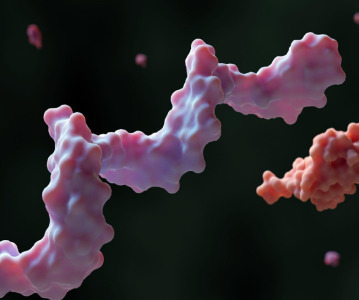Anti-HIV Drugs May Protect Against Puberty Delays in HIV-Infected Children
For children who have been HIV-infected since birth, current anti-HIV drug regimens may protect against the delays in puberty that had been seen in HIV-infected children taking older regimens, according to researchers funded by the National Institutes of Health.
HIV appears to delay puberty. Among children born before 1990, more than 10% of HIV-positive girls and boys had not entered puberty by 12 and 13 years of age, respectively. However, a study published in the journal AIDS has found that puberty was delayed for less than 1% of children born since 1997, when more effective anti-HIV drug therapies became widely available. Combination antiretroviral treatments — three or more drugs from two or more different anti-HIV drug classes — are now the standard therapy.
Presumably, improved health resulting from the more effective therapy allows the children to enter puberty on a more age appropriate timetable, said study author Rohan Hazra, MD, of the Maternal and Pediatric Infectious Disease Branch of the Eunice Kennedy Shriver National Institute of Child Health and Human Development (NICHD).
Based on information collected over 12 years from more than 2000 HIV-infected boys and girls, the researchers found that for each year of combination antiretroviral treatment a child received, puberty started about a month earlier when compared with children with HIV who took other drug therapies or no drugs at all.
“More than 80% of the children in the study born after 1997 are on a combination regimen, so it was difficult to make a comparison between those who received the therapy and the comparatively small number who did not,” said the study’s first author, Paige Williams, PhD, of the Harvard School of Public Health, Boston. “However, the trend in the data suggests that children taking modern drug regimens are likely to experience puberty closer in time to that of their HIV-negative peers.”
The study also included researchers at the University of Colorado School of Medicine and Children’s Hospital Colorado, Aurora; Tulane University School of Medicine, New Orleans; Indiana University School of Medicine, Indianapolis; New York University School of Medicine; New Jersey Medical School, Newark; and Children’s Hospital Los Angeles.
Data for the study were obtained from three NICHD-supported HIV research networks: The International Maternal, Pediatric, Adolescent AIDS Clinical Trials (IMPAACT) Network, the Pediatric AIDS Clinical Trials Group (a predecessor of the IMPAACT Network) and the Pediatric HIV/AIDS Cohort Study.
Major funding for this study came from NICHD and the National Institute of Allergy and Infectious Diseases, also part of NIH. Additional support came from six other NIH institutes: the National Institute of Mental Health, the National Institute on Deafness and Other Communication Disorders, the National Heart, Lung, and Blood Institute, the National Institute of Neurological Disorders and Stroke and the National Institute on Alcohol Abuse and Alcoholism.
To conduct their study, the researchers analysed data from more than 2000 boys and girls with HIV and from an additional 500 boys and girls exposed to HIV before and during birth but who did not become HIV infected. The researchers analysed data obtained on these boys and girls starting from age 7. During the children’s study visit, clinicians assessed the beginning of puberty by noting typical physical changes that occur in adolescence, such as the appearance of pubic hair and the development of breast tissue or genitals.
Researchers confirmed previous findings indicating that HIV can delay the start of puberty. HIV-positive boys started developing pubic hair and larger genitals when they were about 11.5 years old, on average — about a year later than their HIV-negative peers. HIV-positive girls started developing breasts and pubic hair when they were 10.5 years old, compared with 9.5 to 10 years old, on average, for HIV-negative girls. For their analysis, the researchers took into account the trend in recent years toward earlier puberty in US children, as well as racial and ethnic differences in the timing of puberty. However, even after adjusting for these factors, the researchers found that puberty began 4 to 6 months later in HIV-positive boys and girls than in children who did not have HIV.
“In studies of the general population, maturing later has been linked to lower self-esteem and depression, and delays also raise concerns about a person’s future reproductive health,” Dr Hazra said. “So differences of 4 to 6 months may have significant effects.”
The researchers also confirmed that the youth with the most severe symptoms of HIV infection tended to have the greatest delays in puberty.
“As combination regimens for treating HIV have become more widespread, children’s growth has improved and their physical maturation is much closer to the norm,” Dr Williams added. “Today’s recommended treatments for HIV appear to have a protective effect in these regards.”
Related News
-
News Google-backed start-up raises US$600 million to support AI drug discovery and design
London-based Isomorphic Labs, an AI-driven drug design and development start-up backed by Google’s AI research lab DeepMind, has raised US$600 million in its first external funding round by Thrive Capital. The funding will provide further power t... -
News AstraZeneca to invest US$2.5 billion in Beijing R&D centre
Amid investigations of former AstraZeneca China head Leon Wang in 2024, AstraZeneca have outlined plans to establish its sixth global strategic R&D centre in China. Their aim is to further advance life sciences in China with major research and manufact... -
News Experimental drug for managing aortic valve stenosis shows promise
The new small molecule drug ataciguat is garnering attention for its potential to manage aortic valve stenosis, which may prevent the need for surgery and significantly improve patient experience. -
News How GLP-1 agonists are reshaping drug delivery innovations
GLP-1 agonist drug products like Ozempic, Wegovy, and Mounjaro have taken the healthcare industry by storm in recent years. Originally conceived as treatment for Type 2 diabetes, the weight-loss effects of these products have taken on unprecedented int... -
News A Day in the Life of a Start-Up Founder and CEO
At CPHI we work to support Start-Up companies in the pharmaceutical industry and recognise the expertise and innovative angles they bring to the field. Through our Start-Up Programme we have gotten to know some of these leaders, and in this Day in the ... -
News Biopharmaceutical manufacturing boost part of new UK government budget
In their national budget announced by the UK Labour Party, biopharmaceutical production and manufacturing are set to receive a significant boost in capital grants through the Life Sciences Innovative Manufacturing Fund (LSIMF). -
News CPHI Podcast Series: The power of proteins in antibody drug development
In the latest episode of the CPHI Podcast Series, Lucy Chard is joined by Thomas Cornell from Abzena to discuss protein engineering for drug design and development. -
News Amgen sues Samsung biologics unit over biosimilar for bone disease
Samsung Bioepis, the biologics unit of Samsung, has been issued a lawsuit brought forth by Amgen over proposed biosimilars of Amgen’s bone drugs Prolia and Xgeva.
Position your company at the heart of the global Pharma industry with a CPHI Online membership
-
Your products and solutions visible to thousands of visitors within the largest Pharma marketplace
-
Generate high-quality, engaged leads for your business, all year round
-
Promote your business as the industry’s thought-leader by hosting your reports, brochures and videos within your profile
-
Your company’s profile boosted at all participating CPHI events
-
An easy-to-use platform with a detailed dashboard showing your leads and performance







.png)